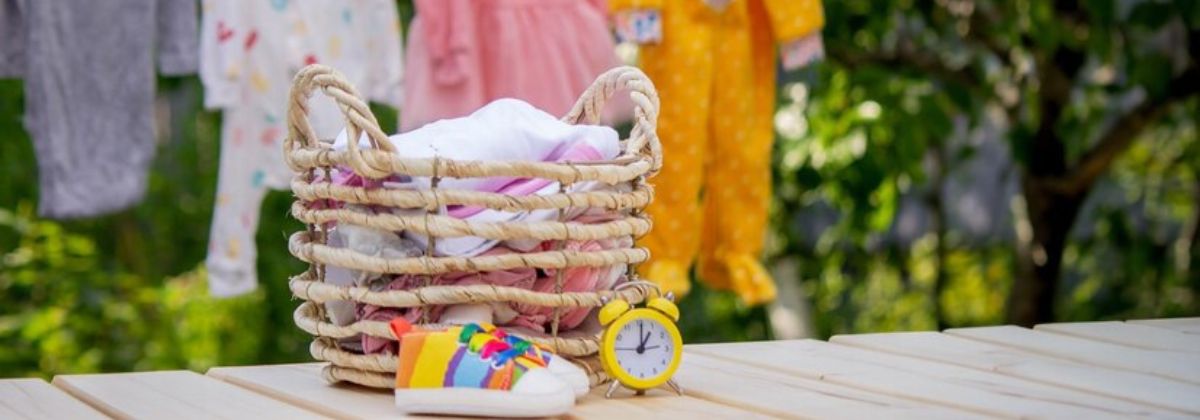31 Aug Gentle Yet Effective: The Best Practices for Washing Baby and Toddler Clothes
Welcoming a new baby or watching your little one grow into a toddler is an incredible journey filled with milestones and memories. Amidst all the joy, there’s also the task of keeping up with their laundry. Baby and toddler clothes are not just adorable, they’re also delicate and require special care to ensure they remain clean, soft, and safe for your little bundle of joy. In this blog post, we’ll delve into the best practices for washing baby and toddler clothes, ensuring they stay fresh and cosy for every adventure.
The Best Practices for Washing Baby and Toddler Clothes
Separate and Sort:
Before you start washing, it’s crucial to sort the laundry. Divide clothes into categories such as colours, fabrics, and levels of dirtiness. Separating heavily soiled items from delicate ones prevents damage and helps maintain the integrity of the fabrics.
Use a Mild Detergent:
Opt for a gentle, hypoallergenic detergent specifically formulated for baby clothes. Avoid products with strong fragrances and harsh chemicals, as they can irritate your little one’s sensitive skin. A mild detergent will effectively remove stains while being kind to the fabric and your baby’s skin.
Pre-treat Stains:
Babies and toddlers are experts at creating stains. Before tossing clothes into the washing machine, treat stains with a baby-safe stain remover. Remember to test the remover on a hidden area first to avoid discolouration or damage.
Wash in Cold Water:
When it comes to baby and toddler clothes, cold water is your best friend. Hot water can cause shrinking, fading, and damage to delicate fibres. Cold water effectively cleans without compromising the integrity of the fabric.
Choose the Right Cycle:
Opt for a gentle or delicate cycle on your washing machine. These cycles have lower agitation levels, which prevent unnecessary wear and tear on the clothes. If you’re dealing with particularly delicate items, placing them in a mesh laundry bag can provide extra protection.
Skip Fabric Softeners:
While fabric softeners can make clothes feel softer, they often contain chemicals that can be harsh on sensitive skin. Instead, use white vinegar in the rinse cycle to naturally soften clothes without any potential skin irritations.
Sun-dry When Possible:
Sunlight works wonders for freshening and naturally disinfecting baby clothes. Whenever possible, line dry clothes in a shaded area to prevent colours from fading. The sun’s gentle rays can help remove stains and leave clothes smelling wonderfully fresh.
Iron with Caution:
Ironing baby and toddler clothes isn’t always necessary, but if you do choose to iron, use the lowest heat setting and ensure the fabric is slightly damp. Iron on the reverse side to prevent any direct contact between the iron and the delicate fabric.
Store with Care:
Once your baby’s clothes are clean and dry, store them properly to maintain their freshness. Use breathable storage solutions and avoid cramming clothes into tight spaces. This prevents creasing and allows air circulation, keeping the clothes in great condition.
Hand-Me-Downs and Storage:
If you’re planning to save baby clothes for future siblings or sentimental reasons, wash and thoroughly dry the clothes before storing them. Use acid-free tissue paper to prevent colour transfer and store them in a cool, dry place away from direct sunlight.
Why Washing Children’s Clothes Is Important?
Welcoming a new baby into the world is a momentous occasion filled with joy and anticipation. Amidst the flurry of preparations and celebrations, one aspect that might not immediately come to mind is the importance of washing baby and toddler clothes. However, this seemingly routine task plays a crucial role in ensuring the health, comfort, and well-being of your little one. Let’s delve into the reasons why washing baby and toddler clothes is so important.
Sensitive Skin:
Babies and toddlers have delicate, sensitive skin that is more prone to irritation and allergies. Newborn skin is not fully developed, making it susceptible to reactions from harsh detergents, residues, and irritants present on clothes. Washing clothes before they are worn removes these potential irritants, reducing the risk of skin discomfort and reactions.
Removal of Germs and Bacteria:
Baby and toddler clothes can easily accumulate germs, bacteria, and even traces of food or bodily fluids. Regular washing helps eliminate these contaminants, promoting a clean and hygienic environment for your child. This is especially crucial to prevent the spread of illnesses and infections during a phase of rapid growth and development.
Chemical Residues:
New clothes often contain chemicals from the manufacturing process, such as dyes, sizing agents, and finishing chemicals. Washing new clothes before putting them on your baby helps remove these residues, which might otherwise come into contact with your baby’s sensitive skin and be ingested through licking or sucking on clothes.
Stain Removal:
Babies and toddlers are notorious for creating messes and stains, whether it’s from spit-up, baby food, or exploring their surroundings. Promptly washing stained clothes increases the likelihood of successful stain removal, preventing permanent marks and prolonging the life of the clothing.
Comfort and Softness:
Baby clothes can sometimes feel rough due to transportation, storage, or manufacturing processes. Washing and using mild, baby-safe detergents can help soften the fabric, making it more comfortable for your little one to wear.
Proper Fit:
Babies and toddlers grow rapidly, and clothes that once fit perfectly can quickly become too snug. Washing and drying clothes might cause slight shrinkage, helping you identify clothes that have become too small and ensuring your child’s wardrobe remains appropriately sized.
Allergen Removal:
Dust, pollen, and other allergens can accumulate on clothing, especially if they’re stored for some time. Regular washing removes these particles, creating a cleaner and healthier environment for your baby.
Click to read more about allergen-free laundry.
Sensory Experience:
Babies and toddlers explore the world around them through touch, taste, and smell. Clean, fresh-smelling clothes provide a positive sensory experience for your child, contributing to their overall well-being and comfort.
Promotes Bonding:
Bathing, dressing, and interacting with your baby during daily routines like changing clothes foster a strong parent-child bond. Clean, soft clothes contribute to a pleasant experience for both you and your little one.
The Last Word
In conclusion, washing baby and toddler clothes is far more than a routine chore; it’s a fundamental aspect of caring for your child’s well-being. From protecting their sensitive skin to ensuring a hygienic and comfortable environment, proper washing practices play a vital role in maintaining your baby’s health and happiness. By understanding the significance of this task, parents can provide their little ones with the best possible start in life.




Sorry, the comment form is closed at this time.